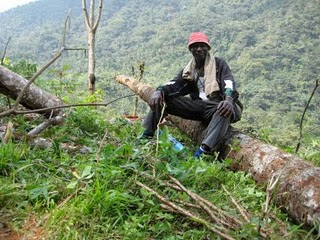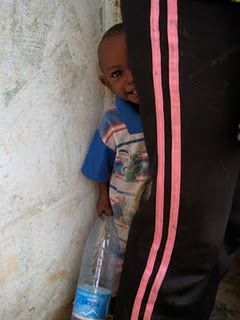Ultimate Frisbee - Les Lions v. Les Tigres
 Wednesday, December 23, 2009 at 02:07PM
Wednesday, December 23, 2009 at 02:07PM  Wednesday, December 23, 2009 at 02:07PM
Wednesday, December 23, 2009 at 02:07PM  Monday, December 21, 2009 at 08:53AM
Monday, December 21, 2009 at 08:53AM Despite the fact that I am in a place where the sun shines 12 hours per day nearly all year round, I'm still happy knowing that it's solstice today, and that the short, dark days at home in Maine will soon be growing longer. Happy Solstice, everyone!
Some commentary from the past few days:
After a week of working in Yaoundé, I traveled back to Dschang this past Saturday. I managed to hitch a ride with Jean Nkengsa, a native of Doumbouo, the village where I worked in 2006, as he and his wife were making the trip from Yaoundé to visit briefly before the holidays and delivery Christmas gifts. The trip was long, but pleasurable – not only because the backseat of a Land Rover is an improvement over the ¾ of a seat I'd otherwise have occupied in a row of a bush taxi, but also because the air temperature and humidity dropped as we climbed into the highlands of the West.
Upon arriving in Dschang, we stopped by Jean's mother's bar, right in the center of Dschang, for a beer. The day before, students throughout Cameroon had received their semester grade reports. There is something incredible in the way that an entire community will celebrate the success of their students. In sitting drinking my Pilsner (a new beer made by Guinness, which is VASTLY better than any of the other pale, water beers available), I watched the celebration ensue: a middle-aged man stepped into the doorway of the bar and beamed as he announced to Jean's maman that his daughter had passed her final exams. (It should be noted that in the Francophone regions of Cameroon, schools function in a French system, with high rates of failure and repetition. Though there is a certain amount of shame associated with having to repeat a grade, it's accepted as a normal part of going through school here.)
So, this man arrived, announced his daughter's success, hugged la maman, shook the hands of all present – all the while beaming – and then departed, undoubtedly to continue spreading the news around town. Meanwhile, each time a newcomer arrived at the bar (and we were there for hours), les mamans would announce the man's daughter's success, and there was cheering and dancing – all in her honor.
Imagine what the state of education in Cameroon – and the entire world, for that matter – would be if government officials shared the same pride and enthusiasm for their childrens' successes.
 Friday, December 18, 2009 at 05:12AM
Friday, December 18, 2009 at 05:12AM While there is, in some ways, an art to taking taxis in the capital city of Yaoundé, much of one's success relies on pure luck. Passengers-to-be stand waiting on curbs, often clustered together in places where taxis can easily pull over. Taxis approach, slowing to a roll, and their drivers listen as potential customers state their desired destinations. If the taxi, likely already partially full, is headed in the direction of your destination, the driver will honk or motion for you to get in. You pay per seat (200f CFA is the current standard rate, up from 100f CFA in 2006), and a fully-loaded taxi seats four across the back seat and three in the front (driver included).
Yesterday, while trying to get a taxi, I stood in a line for nearly 10 minutes, my destination rejected over and over, sometimes with the taximen even shaking their head at my suggestion. As the line of waiting customers thinned, the man to my left looked at me and the woman on his other side and said, "Okay. It's a race. Who is going to get a taxi first?" All three of us had been standing there together, watching everyone else get into cabs, and feeling somewhat helpless. The three of us laughed in solidarity, but then eyed each other competitively, and we were off to the races. Cabs came and went, and then finally, one accepted the mans offer. We high-fived him and laughed, and then off he went. I won second-place, leaving our poor competitor behind to wait for who knows how long.
It's moments like those that remind me how much I love being here.
 Monday, December 14, 2009 at 03:16AM
Monday, December 14, 2009 at 03:16AM Try as I might, time is getting away from me and I'm not writing as much as I'd like to. I spent this past week in the Southwest Region of Cameroon, a part of the country I have hardly explored. The Southwest is most well known for its beautiful black sand beaches in Limbe, and for its 4000 meter Mount Cameroon, an active volcano that is the tallest mountain in all of West and Central Africa. I've climbed Mount Cameroon and visited Limbes beaches many times, and once, in 2006, I visited the region's government seat in Menji-Fontem while visiting Peace Corps volunteer Bethany Marsh. But until this past week, I had never truly seen the Southwest Region.


As with most schedules in Cameroon, we fell well behind ours after just our first two stops – simply because our hosts at the first two schools we visited (a Government Technical College, or GTC, and a primary school) insisted on providing us with food and beverage. Le Cameroun c'est le Cameroun!
- Having the children at the primary school perform songs for us;
- Crossing a narrow, rickety bridge made of vines;
 - Arriving in Bechati with enough daylight remaining to squeeze in a bath in the river.
- Arriving in Bechati with enough daylight remaining to squeeze in a bath in the river.


On Thursday, we spent most of the day in the back of the Helix as it thrashed its way up the rutted valley road. Probably the most typical Cameroonian-circumstance we encountered was a group of men working on installing electric lines, who, in doing their work, had felled three trees over the road and moved on without removing them. Without losing too much time, we managed to have them saw the trees out of the way – and almost lost one over the edge of the cliff when Ryan under-estimated his own strength. :)
 I returned to Dschang yesterday morning in time to make a noon meeting in Doumbouo – but before departing Lewoh took part in an early morning meeting in which Treana, Ryan, Ed, Leke Tambo of CIC, and I laid out the beginnings of plans for Breaking Ground to bring an agricultural enterprise development program to the Valley. We still have lots of work to do concerning that program, but one thing is sure: the partnership between Breaking Ground, Obakki, ICA, and CIC holds great promise.
I returned to Dschang yesterday morning in time to make a noon meeting in Doumbouo – but before departing Lewoh took part in an early morning meeting in which Treana, Ryan, Ed, Leke Tambo of CIC, and I laid out the beginnings of plans for Breaking Ground to bring an agricultural enterprise development program to the Valley. We still have lots of work to do concerning that program, but one thing is sure: the partnership between Breaking Ground, Obakki, ICA, and CIC holds great promise.
 Sunday, December 6, 2009 at 03:02PM
Sunday, December 6, 2009 at 03:02PM Cameroonians are clean people. So clean, in fact, that it's rare for their clothes to show dirt - even on the dustiest of days - unless they are farming, working construction, or doing some other form of work that necessitates getting dirty. Generally, if you see at dusty, dirty person out about in town, it's safe to say their probably mentally ill and/or homeless. Children are scolded for getting themselves dirty - though this is pretty much inevitable.
Needless to say, then, heads turned today when a white lady (me) carrying a strange white disk (a frisbee) took off today with a gaggle of ecstatic children to the nearby football/soccer pitch (grassless, of course), lined the children up by height, divided the group into two teams (Les Tigres v. Les Elephants), and proceeded to engage in a strange game in which children routinely splayed out in the dirt, kicking up a storm of dust, and shrieking with laughter all the while.
After a long hiatus since college, I began playing Ultimate Frisbee again in my hometown of Portland, Maine this past fall. I had a blast playing with PortSports, and will definitely play again this spring. For the time being, however, I'm going to work on molding this group of rag-tag kids into two somewhat-organized frisbee teams. Our biggest obstacle today was understanding the fact that when a team scores, both sides change directions. Second biggest problem was knowing who was one whose team. I'm going to buy some cloth in the market tomorrow to make colored arm/headbands to distinguish teams. We made a LOT of progress in understanding that one can't run with the frisbee, but only after having to stop the game on multiple occasions to re-explain that the person in possession of the frisbee must be planted like a tree.
Probably the most exciting thing about the game today was the fact that, of the four or five kids who really got what was going on, two of them were girls. I had one girl go "long" (on a pretty short field) for me for several spectacular goals.
Needless to say, we were ridiculously filthy when we returned back to the chefferie. So dirty that the old women sitting outside their houses clucked at me in disapproval (but also found the whole situation pretty entertaining). I'll take that as a compliment.
© Breaking Ground 2020. Breaking Ground is a registered 501(c)(3) public charity. |